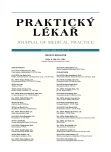-
Medical journals
- Career
Ulcerogenic corticosteroids – the persisting myth among Czech doctors
Authors: K. Hlavová 1; J. Martínek 1; F. Závada 1; M. Zavoral 1; O. Urban 2; S. Rejchrt 3
Authors‘ workplace: Univerzita Karlova, Interní klinika 1. LF UK a ÚVN Praha, Přednosta: plk. prof. MUDr. Miroslav Zavoral, PhD. 1; Vítkovická nemocnice, Centrum péče o zažívací trakt, Primář: MUDr. Ondřej Urban, PhD. 2; II. interní klinika gastroenterologie FN Hradec Králové, Přednosta: prof. MUDr. Jaroslav Malý, CSc. 3
Published in: Prakt. Lék. 2011; 91(12): 710-713
Category: Of different specialties
Overview
Corticosteroids were once considered highly ulcerogenic drugs. Despite the fact that many studies have not confirmed this fact, a large percentage of doctors still consider them as ulcerogenic. Even the renowned textbooks from various disciplines do not consider corticosteroids ulcerogenic except when administered with Non-Steroidal Anti-Rheumatic Agents (Non-steroidal anti-inflammatory drugs – NSAIDs). We ourselves have conducted a study in which we investigated the views of Czech doctors from various specialties and medical students on the ulcerogenicity of steroids. Not surprisingly, we have confirmed the expected – more than 80 % of the responding doctors and students consider corticosteroids to be highly ulcerogenic.
The only exception is in the field of Gastroenterology where 30 % of respondents did not consider the steroids ulcerogenic.
When comparing ulcerogenic potential of- ibuprofen,
- diclofenac, and
- prednisone, total of 40 % of respondents consider prednisone the most ulcerogenic.
Key words:
corticosteroids, ulcerogenity, peptic ulcer.
Sources
1. Hench P.S. A reminiscence of certain events before, during, and after the discovery of cortisone. Minn. Med. 1953, 36(7), p. 705-710.
2. Rogers K. (Ed.). Medicine and Healers Through History. Chapter V. Progress in the understanding of disease in the 20th century. New York: Britannica Educational Publishing, 2011, p. 108-110.
3. Hynie, S. Hormony kůry nadledvin. In Hynie, S. Farmakologie v kostce. Praha: Triton 2001, s. 348-350.
4. Lüllmann, H., Mohr, K., Wehling, M. Kůra nadledvin a pohlavní žlázy. In Lüllmann, H., Mohr, K., Wehling, M. Farmakologie a toxikologie. Překlad 15., zcela přepracovaného vydání. Praha: Grada 2004, s. 437-447.
5. Marek, J. Léčba kortikoidy. Česká lékařská společnost Jana Evangelisty Purkyně: Doporučené postupy pro praktické lékaře [online]. 2002, o/021/296, Dostupný z WWW: www.cls.cz/dokumenty2/os/t296.rtf [cit. 2011-09-06].
6. Widimský, J. Endokrinologie. In Klener, P. a kol. Vnitřní lékařství. Praha: Galén, 2001, s. 783-788.
7. Čáp, J. Endokrinologie. In Bureš, J. a kol. Základy vnitřního lékařství. Praha: Galén, 2003, s. 554-557.
8. Conn, H.O., Blitzer, B.L. Nonassociation of adrenocorticoid therapy and peptic ulcer. N. Eng. J. Med. 1976, 294, 473-479.
9. Messer, J., Reitman, D., Sacks, H.S. et al. Association of adrenocorticoid therapy and peptic ulcer. N. Eng. J. Med. 1983, 309, p. 21-24.
10. Conn, H.O., Poynard, T. Corticosteroids and peptic ulcer: meta-analysis of adverse events during steroid therapy. J. Int. Med. 1994, 236, p. 619-632.
11. Piper, J.M., Ray, W.A., Daugherty, J.R., Griffin, M.R. Corticosteroid use and peptic ulcer disease: role of nonsteroidal anti-inflammatory drugs. Ann. Intern. Med. 1991, 114, p. 735-740.
12. Grendt, S.J., Rodriguez, J.L., Pawlik, J.W. et al. Consequences of high-dose steroid therapy for acute spinal cord injury. J. Trauma 1997, 42, p. 279-284.
13. Caroll, T.A., Morris, K., Rawluk, D. Gastroprotection in neurosurgery: the practice in Great Britain. Br. J. Neurosurg. 1997, 11, p. 39-42.
14. Singh, J.M., Palda, V.A., Standbrook, M.B., Chapman, K.R. Corticosteroid therapy for patients with acute exacerbations of chronic obstructive pulmonary disease. A systematic review. Arch. Intern. Med. 2002,162, p. 2527-2536.
15. Filaretova, L., Podvigina, T., Bagaeva, T. et al. Gastroprotective role of glucocorticoid hormones. J. Pharmacol. Sci. 2007, 104, p. 195-201.
16. Martinek, J., Hlavova, K., Zavada, F. et al. “A surviving myth” – corticosteroids are still considered ulcerogenic by a majority of physicians. Scand. J. Gastroenterol. 2010, 45, p. 1156-1161.
Labels
General practitioner for children and adolescents General practitioner for adults
Article was published inGeneral Practitioner

2011 Issue 12-
All articles in this issue
-
Basics of social cognitive and affective neuroscience.
XII. Genes and culture - Long-term care medicine in our country and abroad
- Classification of techniques to cope with craving
- Interstitial lung diseases in questions and answers
- Ulcerogenic corticosteroids – the persisting myth among Czech doctors
- Standardization of nutritional care in nursing home care
- Embedded counselling in medicine
- Comparison of DXA and BIA in obese women indicated a sleeve gastrectomy – pilot study
-
Euthanasia and conscience.
Why are ethical discussions so difficult? - Deficit Fluid Volume rating by nurses according to the diagnostic cues of nursing diagnosis
- Telomeres and the influence of lifestyle on their length
- Sorafenib – a new hope for patients with hepatocellular cancer
- Investigation of spine asymmetry in preschool children
-
Basics of social cognitive and affective neuroscience.
- General Practitioner
- Journal archive
- Current issue
- Online only
- About the journal
Most read in this issue- Ulcerogenic corticosteroids – the persisting myth among Czech doctors
- Classification of techniques to cope with craving
- Deficit Fluid Volume rating by nurses according to the diagnostic cues of nursing diagnosis
- Interstitial lung diseases in questions and answers
Login#ADS_BOTTOM_SCRIPTS#Forgotten passwordEnter the email address that you registered with. We will send you instructions on how to set a new password.
- Career

